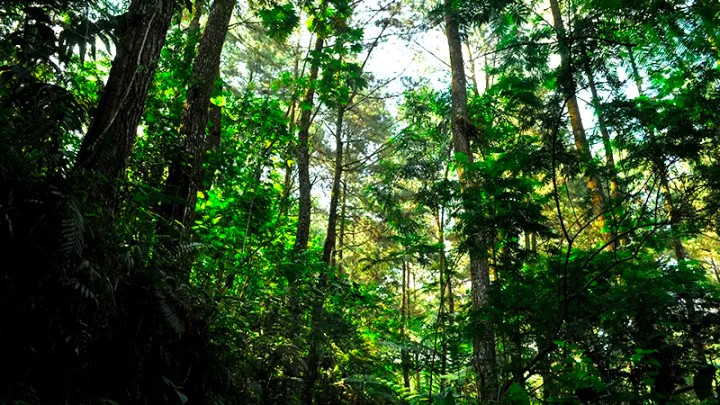“And/also”, not “Either/or” — The need to restore nature AND cut emissions
The article originally appeared in Medium, May 4, 2020
“The many challenges to life on our planet require bold actions and a sustainable management that includes biodiversity and nature as part of the solution. The Nature-based solutions (NBS) framework for tackling socio-environmental challenges has this ambition at its core. The approach is inspired by nature and supportive of local ecosystems and responsive to their future health. NBSs therefore inherently recognize the survival of species and their functions for future generations as vital element for a sustainable use of our planet.”
Walter Jetz, Yale University and E.O. Wilson Biodiversity Foundation Scientific Chair


Nature-based solutions: #TogetherWithNature
Amidst the tragedy of the COVID-19 pandemic and home confinement, many people long for the joy and refuge of nature. The restrictions have heightened our collective awareness of nature’s many benefits — from the tranquillity of the outdoors to clean air and water, natural resources, disease suppression, and the capacity to help slow climate change and protect us from its impacts.
Last week also marked the 50th anniversary of Earth Day. Earth Day was created to call the world to action on our most serious and systemic environmental challenges of that moment. Today we face the long-standing global environmental crises of climate change and biodiversity loss. We can no longer delay acting on the clear and growing evidence from science and practice that Nature-Based Solutions can help tackle those crises.
We have been losing intact ecosystems worldwide for unsustainable commodity production. It is simply essential that we halt these losses and tip the scales in the other direction. Reversing the current high rates of loss and growing the global carbon pools in healthy vegetation and soil can help reduce the amount of carbon in the atmosphere. The right investment in ecosystems around the world — such as forests, grasslands and wetlands — can tremendously benefit climate change, biodiversity, and human health and wellbeing.
The world is ready to take Nature-Based Solutions to scale. The launch of ‘trillion tree’ initiatives to protect and restore ecosystems, along with the upcoming UN Decade on Ecosystem Restoration add momentum to existing efforts such as the Bonn Challenge, New York Declaration on Forests and others to scale Nature-Based Solutions. This unprecedented financial and political backing by governments, corporate leaders, NGOs, civil society and others could be the game-changer that drives a resurgent bottom-up movement of local actions with global significance.
We must not squander this opportunity. Nature-Based Solutions cannot be used as a reason to defer ambitious cuts to greenhouse gas emissions, cover for investments that lock-in high-carbon resources, nor an excuse to lift environmental protections. It’s important that nature-based activities be complemented by emissions reductions at source, comprehensive climate policies and proper accountability.
To ensure that we capitalize on the immense opportunity that Nature-Based Solutions provide, environmental scientists and NGOs have been collaborating to provide clarity and guidance to the increasing interest in Nature-Based Solutions. In a letter to the President of COP26, 20 organizations outlined evidence-based guidelines for Nature-Based Solutions. In June this year, the International Union for the Conservation of Nature (IUCN) will launch new Global Standards as a socially and ecologically responsible benchmark for state and non-state actors, following two-years of consultation across 100 countries.
Among all the emerging guidelines and standards, which are critical for successful restoration and conservation, we see four high-level principles that pervade them. We call on those committing to Nature-Based Solutions to uphold and practise these principles:
1. Cut Emissions
Nature-Based Solutions are powerful tools to capture carbon from the atmosphere, but they are not a substitute for cutting greenhouse gas emissions. From a climate change perspective, we must rapidly cut fossil fuel emissions, decarbonize economies and also maintain, sustainably manage and restore ecosystems.
2. Conserve and Protect Existing Ecosystems
Intact soils, forests, grasslands, shrublands, wetlands and aquatic ecosystems are vital repositories of carbon and biodiversity. Yet, we are losing them at an alarming rate. Protecting these last remaining strongholds of nature is critical.
3. Be Socially Responsible
We must fully engage Indigenous peoples and local communities and respect and uphold their rights and leadership. We must also proactively contribute to fair and sustainable economic models that create new employment opportunities while avoiding competition with existing activities such as food production. Only when local communities benefit from the social, economic and ecological benefits that ecosystems provide can restoration be sustainable.
4. Be Ecologically Responsible
Nature-Based Solutions must be founded on rigorous ecological principles. Biodiversity is vital for healthy ecosystems which are more productive, resilient and beneficial. Diverse mixtures of native species are most likely to provide desired benefits such as carbon storage, food production, and protection from floods, drought and disease. Monocultures of exotic species or low-diversity plantations are unlikely to provide these desired benefits.
We live at a time when Earth’s ecosystems are more vulnerable and depleted than they have ever been. But this is also an exciting time because we now understand both the scale of the problem and the potential scale of the solution. We also have unprecedented capacity, momentum and scientific information to successfully implement Nature-Based Solutions.
We all have the opportunity to engage in the fight against the global threats of biodiversity loss and climate change. We can be less damaging — by drastically cutting emissions and protecting our remaining natural areas — AND we can be more beneficial by supporting socially and ecologically responsible Nature-Based Solutions that support planetary and human health. With the right approach, we can make sure that we do not let this opportunity pass us by.
A global call from organizations supporting Nature-Based Solutions
Christiana Figueres, Co-founder, Global Optimism
Prof. Dr. Thomas Crowther, Crowther Lab, ETH Zurich
Sally Jewell, CEO, The Nature Conservancy
Jad Daley, CEO, American Forests
M. Sanjayan, CEO, Conservation International
Andrew Steer, President and CEO, WRI
Nick Stern, Chair, Grantham Institute for Climate Change & Environment
Paul Polman, Co-founder and Chair, IMAGINE
Stewart Maginnis, Global Director, Nature Based Solutions Group, International Union for Conservation of Nature (IUCN)
Professor Thomas Lovejoy, George Mason University
Victoria Tauli-Corpuz, chair of Nia Tero and former UN Special Rapporteur on the Rights of Indigenous Peoples
Peter Seligmann, CEO, Nia Tero
Musonda Mumba. Chair, Global Partnership on Forest and Landscape Restoration
Manuel Pulgar Vidal, Climate, Energy Global Leader and Will Baldwin-Cantello, Forest Global Leader, WWF International
Jules Kortenhorst, CEO, Rocky Mountain Institute
Professor Nathalie Seddon, Nature-based Solutions Initiative, University of Oxford
Aron Cramer, President and CEO, BSR
Fiona Reynolds, CEO, Principles for Responsible Investing (PRI)
Achala C. Abeysinghe, Country Representative in Papua New Guinea, GGGI
Professor Gail Whiteman, Lancaster University and Exeter University
Halla Tómasdóttir, CEO, B Team
Martin Siegert, Co-Director, Grantham Institute for Climate Change & Environment
Professor Joanna Haigh, Distinguished Research Fellow, Emeritus Professor of Atmospheric Physics, Grantham Institute for Climate Change & Environment
Tomás Insua, Executive Director, Global Climate Catholic Movement
Dr. Gunhild Stordhalen, Founder & Executive Chair, EAT Forum
Jurriaan Ruys, CEO, Land Life Company
Martin Harper, Global Conservation Director, The Royal Society for the Protection of Birds (RSPB)
Betsy Taylor, President, Breakthrough Strategies & Solutions, LLC
Sandrine Dixon, Co President, The Club of Rome
Yolanda Kakabadse, Former President of WWF & IUCN
Julia Jackson, Founder, Grounded.org
Dr. Andrew Norton, Director, International Institute for Environment and Development
Justin Adams, Executive Director, Tropical Forest Alliance, Director of 1t.org
Jeremy Oppenheim, Global Principal, Food and Land Use Coalition
Felix Finkbeiner, Chairman, Plant for the Planet
Dr. Alain Paquette, Université du Québec à Montréal and Global Forest Biodiversity Initiative (GFBI) Steering Committee
Dr. Bruno Hérault, Centre de Coopération Internationale en Recherche Agronomique pour le Développement (CIRAD) and Global Forest Biodiversity Initiative (GFBI) Steering Committee
Dr. Giorgio Alberti, University of Udine and Global Forest Biodiversity Initiative (GFBI) Steering Committee
Dr. Jean Francois Bastin, University of Gent and Global Forest Biodiversity Initiative (GFBI) Steering Committee
Dr. Peter Reich, University of Minnesota, Western Sydney University, and Global Forest Biodiversity Initiative (GFBI) Steering Committee
Dr. Gert-Jan Nabuurs, Wageningen University and Research (WUR) and Global Forest Biodiversity Initiative (GFBI) Steering Committee
Dr. Javier G. P. Gamarra, Global Forest Biodiversity Initiative (GFBI) Steering Committee
Dr. Mo Zhou, Purdue University and Global Forest Biodiversity Initiative (GFBI) Steering Committee
Prof. Dr. Sergio de-Miguel, University of Lleida (UdL), Forest Science and Technology Centre of Catalonia (CTFC) and Global Forest Biodiversity Initiative (GFBI) Steering Committee
Prof. Dr. Hans Pretzsch, Technische Universität München and Global Forest Biodiversity Initiative (GFBI) Steering Committee
Dr. Jingjing Liang, Purdue University and Global Forest Biodiversity Initiative (GFBI) Steering Committee
Dr. Nicolas Picard, GIP Ecofor and Global Forest Biodiversity Initiative (GFBI) Steering Committee
Dr. Susan Wiser, Global Forest Biodiversity Initiative (GFBI) Steering Committee, Christchurch, New Zealand
Dr. Diana H. Wall, Professor, Colorado State University and Scientific Chair, Global Soil Biodiversity Initiative
Professor Dr. Nina Buchmann, Head of Department of Environmental Systems Science, ETH Zurich
Robin Chazdon, University of the Sunshine Coast
Dr. Stephen Fitch, Founder and CEO, Eden Reforestation Projects
Maas Goote, CEO, DOB Ecology
Dr. Dawn Wright, Chief Scientist, Esri
Professor Piers Forster, Director Priestley International Centre for Climate, University of Leeds
Professor Dominick Spracklen, University of Leeds
Dr. Cat Scott, University of Leeds
Professor Gabriele Hegerl, University of Edinburgh
Lucy Almond, Chair, Nature 4 Climate
Mark Gough, CEO, Capitals Coalition
Melanie Heath, Director of Science, Policy & Information, Birdlife International
Paul Simpson, CEO, CDP
Juan Dumas, Partner, Meliquina Ltd
Pedro Tarak, Co-Founder & Global Bridge Builder, Sistema B
Ana Cristina Moeri, President, Eksos Brasil
Manuel Rodríguez-Becerra, President, National Environmental Forum (Colombia), Emeritus Professor, Universidad de los Andes
Gabriel Baracatt Sabat, CEO, Avina Fundacion
Jose Ignacio Morejon, Co-founder and Executive Director, Sistema B Ecuador
Dr. Paula Ehrlich, President and CEO, E.O. Wilson Biodiversity Foundation and lead, Half-Earth Project
Dr. Walter Jetz, Yale University, Scientific Chair of E.O. Wilson Biodiversity Foundation and lead, Half-Earth Project Map
Willem Ferwerda, CEO, Commonland
Pablo Lloret, Chief Executive Officer, Fundación Futuro Latinoamericano

